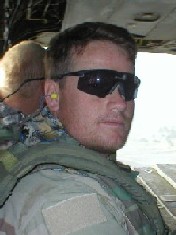Why We Went To Iraq - Without The Lies
Conflict within the Pentagon
A HARDBALL-NEWSWEEK SPECIAL REPORT
MSNBC
By David Shuster
Updated: 10:35 a.m. ET Jan. 12, 2005
WASHINGTON D.C. - In the movies, it’s usually the military eager for war and combat, and the civilians and the defense department pressing for restraint. But it hasn’t been that way with the war in Iraq.
Long before President Bush gave the orders, using force to topple Saddam was a glint in the eye of the civilians who would become key players in the Bush administration.
In 1998, a neoconservative think tank called the Project for the New American Century wrote to President Clinton, “The only acceptable strategy is one that eliminates the possibility that Iraq will be able to use or threaten to use weapons of mass destruction. In the near term, this means a willingness to ‘undertake military action.’”
A list of those who signed the 1998 letter include Donald Rumsfeld, Paul Wolfowitz, Richard Perle, Elliot Abrams, and John Bolton.
In addition to those who signed the 1998 pronouncement, Perle and two of his top associates had already urged an aggressive new strategy in 1996. Perle’s group embraced overthrowing Iraq’s Saddam and replacing him with a monarchy that would “redefine Iraq.”
In 1998, after Iraq severed ties with the U.N. commission in charge of weapons inspectors, Congress passed the Iraqi Liberation Act. It called for arming rebel forces, but did not advocate U.S. military involvement.
Two years ago, during the run-up to the war, the divide between cautious military leaders and hawkish civilians got wider.
Gen. Eric K. Shinseki, Ret., former Chief of Staff of the U.S. Army said of a war in Iraq:
“Something on the order of several hundred thousand soldiers, are probably, you know, a figure that would be required. We’re talking about post-hostilities control over a piece of geography that’s fairly significant with the kinds of ethnic tensions that could lead to other problems. —Feb. 23, 2003
And for Donald Rumsfeld:
“The idea that it would take several hundred thousand U.S. forces I think is far from the mark.” —February 27, 2003
Military leaders offered a mixed assessment about an Iraq without Saddam. Civilian neocons predicted that Iraqis would happily celebrate Saddam’s demise.
Story Link: http://www.msnbc.msn.com/id/6814437/
-----
Just remember how this administration used the NEO-CON Crisis Creation Process to convince us to go and then look at how they are approaching all their new agenda items.
Food for thought.
Conflict within the Pentagon
A HARDBALL-NEWSWEEK SPECIAL REPORT
MSNBC
By David Shuster
Updated: 10:35 a.m. ET Jan. 12, 2005
WASHINGTON D.C. - In the movies, it’s usually the military eager for war and combat, and the civilians and the defense department pressing for restraint. But it hasn’t been that way with the war in Iraq.
Long before President Bush gave the orders, using force to topple Saddam was a glint in the eye of the civilians who would become key players in the Bush administration.
In 1998, a neoconservative think tank called the Project for the New American Century wrote to President Clinton, “The only acceptable strategy is one that eliminates the possibility that Iraq will be able to use or threaten to use weapons of mass destruction. In the near term, this means a willingness to ‘undertake military action.’”
A list of those who signed the 1998 letter include Donald Rumsfeld, Paul Wolfowitz, Richard Perle, Elliot Abrams, and John Bolton.
In addition to those who signed the 1998 pronouncement, Perle and two of his top associates had already urged an aggressive new strategy in 1996. Perle’s group embraced overthrowing Iraq’s Saddam and replacing him with a monarchy that would “redefine Iraq.”
In 1998, after Iraq severed ties with the U.N. commission in charge of weapons inspectors, Congress passed the Iraqi Liberation Act. It called for arming rebel forces, but did not advocate U.S. military involvement.
Two years ago, during the run-up to the war, the divide between cautious military leaders and hawkish civilians got wider.
Gen. Eric K. Shinseki, Ret., former Chief of Staff of the U.S. Army said of a war in Iraq:
“Something on the order of several hundred thousand soldiers, are probably, you know, a figure that would be required. We’re talking about post-hostilities control over a piece of geography that’s fairly significant with the kinds of ethnic tensions that could lead to other problems. —Feb. 23, 2003
And for Donald Rumsfeld:
“The idea that it would take several hundred thousand U.S. forces I think is far from the mark.” —February 27, 2003
Military leaders offered a mixed assessment about an Iraq without Saddam. Civilian neocons predicted that Iraqis would happily celebrate Saddam’s demise.
Story Link: http://www.msnbc.msn.com/id/6814437/
-----
Just remember how this administration used the NEO-CON Crisis Creation Process to convince us to go and then look at how they are approaching all their new agenda items.
Food for thought.


1 Comments:
I just wanted to let you know I really appreciate your posts on the Al Franken blog. You're really quite brilliant and are one of the best posters there. Thanks for sharing your wisdom with us!
jillan0517
Post a Comment
<< Home